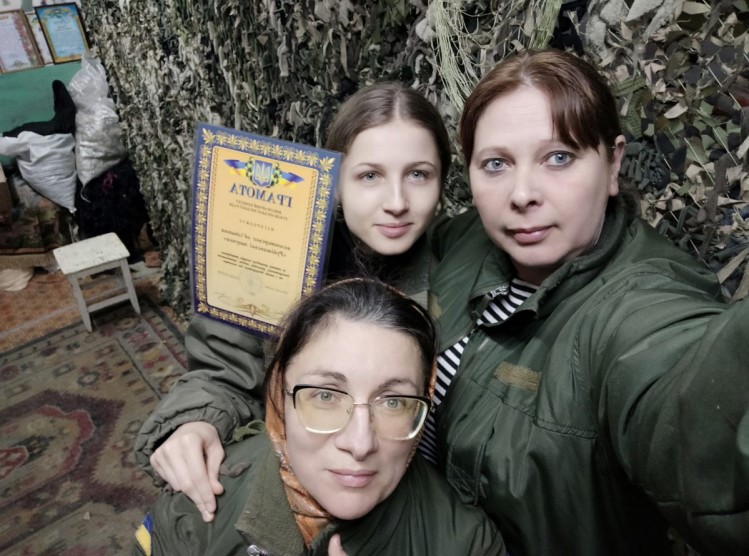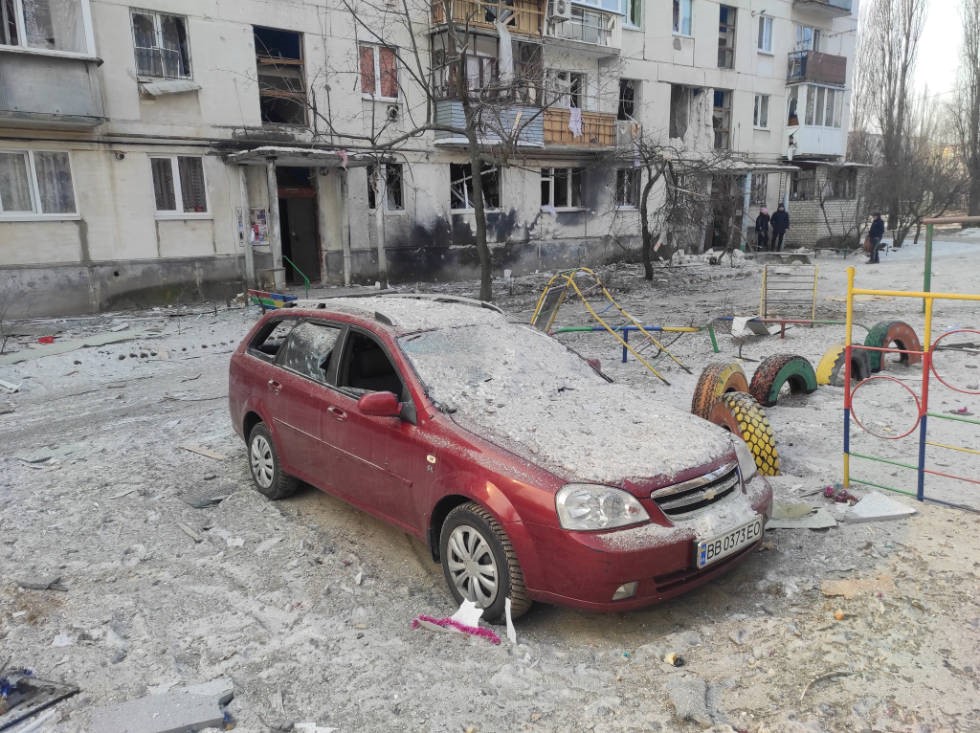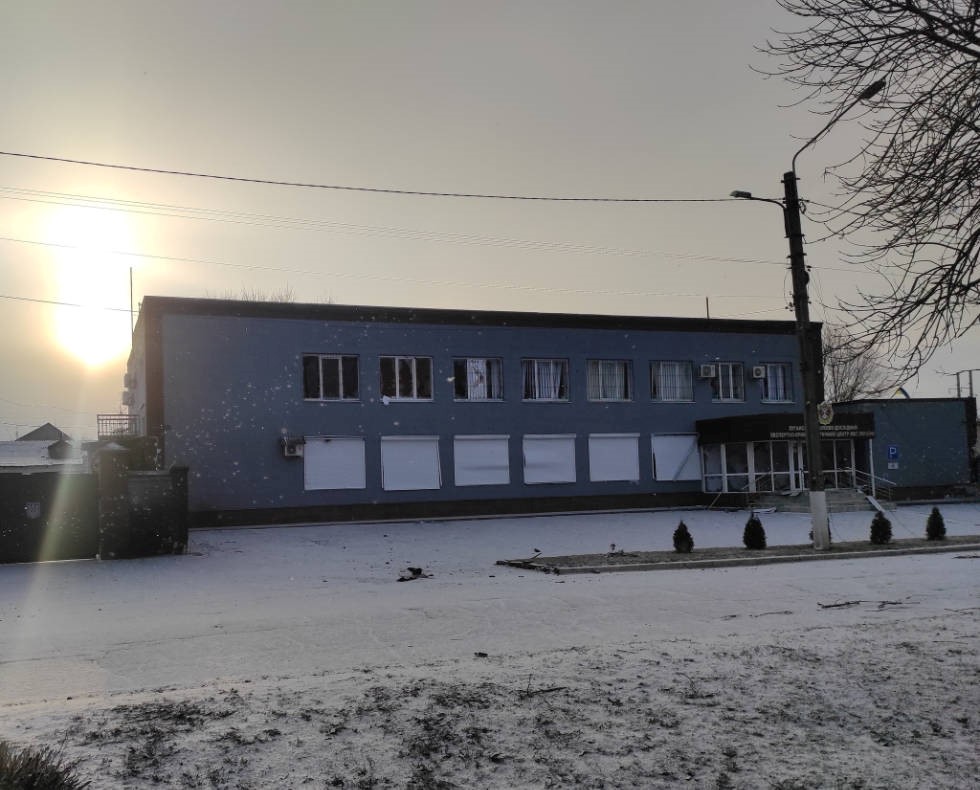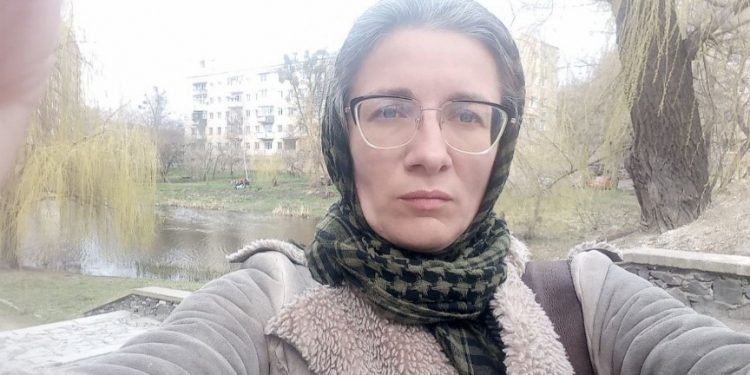Yuliya Sabayeva spent most of her life in Kadiivka, in the Alchevsk District of Luhansk Oblast. When the war began in 2014, she and her family moved to Rubizhne. However, on February 24, 2022, they had to evacuate again. As a displaced person and a volunteer under fire, she shares her evacuation experiences with cats in hand and her battle against Russian propaganda with the NUJU journalists.
“I’ve never felt as good anywhere as in Rubizhne.”
Until October 17, 2014, Yuliya was a journalist in Kadiivka with a happy family. Their lives changed when a Russian neighbor’s intrusion forced them and thousands of Luhansk residents to flee their hometowns.
— We were driving at night in a friend’s car. Children in the backseat, me in the passenger seat with a huge potted flower in my lap. The car was packed with all sorts of things – from jars to pieces of plywood.
Yuliya and her family moved across Luhansk for six years. They settled in Rubizhne in 2020. Yuliya became a journalist at “Rubizhanske Novyny,” and her daughter studied in Kharkiv. Yuliya embraced volunteering, bringing vibrancy back to life.
— Perhaps I’ve never felt as good as in Rubizhne. I’m a grown woman now, I can live for myself. My children grew up. I had a wonderful patriotic circle – people with shared interests with whom we could volunteer and discuss things. I had a purpose, a wonderful place to live, even if it was rented. Everything was perfectly normal,— the journalist recalls. — Until February 2022. It felt like déjà vu.
“On February 24, I didn’t sense that something was wrong.”
Since February 16, Yuliya recalls, headlines were reporting an intensifying frontline situation. Yet, after eight years of war in Donbas, the true sense of danger had faded. No one expected the enemy to advance across Ukraine and brutally harm civilians. On February 24, as Russian forces moved through Luhansk Oblast, Yuliya was interviewing the deputy mayor.
— On February 24, I came to work and even managed to calm everyone down. Just imagine, at that time, the news flashed headlines like: ‘Stanytsia Luhanska Shelled,’ ‘Russian Columns with Equipment Moving through Starobilsk.’ I tried to avoid those headlines. That day, I even went for an interview with the executive committee. We were preparing an issue for International Women’s Day, and I was going to record a conversation with the deputy mayor. We had a great conversation. Can you imagine the situation: both of us went to work that day, believing everything would be fine? So, on February 24, I didn’t sense that something was wrong.
The following day, the city came under heavy shelling. Buildings were bombed one after another, and people sought refuge in basements. Yuliya and her family couldn’t leave their cozy haven.
— Many people, of course, moved to shelters because staying in apartments was very dangerous. We lived on the first floor and decided that, psychologically, it would be better for us to stay in our apartment. Maybe it was wrong, but we thought it would be better at that moment. We mostly sat on the floor but had meals we cooked in our kitchen. We were surrounded by familiar walls, so we were in a familiar environment,— Ms. Sabayeva says.
Working as before became impossible under continuous shelling, so Yuliya became a volunteer at the local humanitarian headquarters.
— I joined the volunteer group ‘Rubizhanski Pavuchky’ [Rubizhne Spiders]. I cooked food, ran to pharmacies for medicines for soldiers, opened the humanitarian headquarters to distribute potatoes to people, and collected items for the soldiers at the frontlines. I felt useful there.

On March 9th, the city was completely disconnected from electricity, and communication was only possible on the upper floors. There were no groceries available – none of the stores were open. Staying in the city became increasingly dangerous and senseless. Julia’s friends insisted on evacuation, even though everyone understood then that there were no more buses.
— We decided to leave on the 15th, and the last bus was, I believe, on March 13th. In the morning, we set out, you know, like a group of desperate people. I had two cats with me, my husband had a bag of tools, our son carried a huge monitor in his hands because it was the most valuable thing for him, and two of our friends had similar company and baggage,— recalls Julia. — There were explosions around, heaps of broken glass under our feet, buildings pierced through, children’s things scattered on the ground… It was very frightening. But we managed to reach the executive committee building, where the bus was supposed to depart from. However, there was no bus…

Escape from the blockade was only possible on the 21st day of the full-scale invasion. At that point, Yuliya’s daughter, who had already left Kharkiv for Kirovohrad Oblast, found a driver willing to travel hundreds of kilometers to rescue her parents.
— My daughter arranged that the driver would come to the train station around 4 AM on the 17th, and we were supposed to be there. It was almost on the other side of the city from us. We walked in the darkness amidst explosions. The men managed to take some photos. It seemed unreal. Somehow, we finally reached the designated place and heard a strange whistle. It turned out that gas was leaking from somewhere. I shouted to my group, ‘Don’t go there, it’s gas. One match and everything will explode.’ Luckily, nothing happened. We went into a small pit, where we took cover during the ‘air raids’ while waiting for the car. And then… then I only remember an endlessly long road. I consider that day as our second birthday, and we ‘were born’ thanks to my child and the driver,— the journalist recounts.
“90% of the help in 2022 came from acquaintances and friends.”
At last, Yuliya’s family reached Kirovohrad Oblast. She quickly let her colleagues know she was safe, and they had already arranged a remote job for her.
— My colleague, without knowing I was alive and had left, recommended me to the ‘Ostrov news agency, and they agreed to hire me as a journalist. So, as soon as we were safe, I already had a job,— Yuliya says. — By the way, this really supported me then and continues to support me now. To know that you are a needed professional, surrounded by people ready to help. I want to say that 90% of the help I received in 2022 came from acquaintances and friends.
Now, Yuliya lives in the charming city of Svaliava in Zakarpattia. She’s involved in the “City Aura” project, continues her professional work, and is proud that Ukrainian journalism is steadily countering Russian propaganda.
— I sense a shift in the information war favoring us recently. Our journalistic efforts are making a difference. Sadly, it came at a cost. Now that I’m alive and see progress, I’m determined to fortify these gains. Where we’ll be in the future, that’s another question,— concludes Yuliya Sabayeva.

This series, titled Executed Free Speech, is created as part of a project Drawing Ukrainian And International Audience’s Attention To Serious Violations Of Human Rights And Crimes Against Journalists And Mass Media By The Russian Federation, which is performed by the National Union of Journalists of Ukraine, with support from the Swedish non-profit organization Civil Rights Defenders.
JOURNALISTS ARE IMPORTANT. Stories of Life and Work in Conditions of War is a cycle of materials prepared by the team of the NUJU with the support of the Swedish human rights organization Civil Rights Defenders.
#CRD

 THE NATIONAL UNION OF
JOURNALISTS OF UKRAINE
THE NATIONAL UNION OF
JOURNALISTS OF UKRAINE
















Discussion about this post